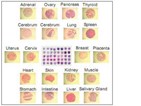Ready-To-Use Frozen Tissue Arrays

Amsbio offers a comprehensive range of high quality frozen tissue arrays for validating the clinical relevance of potential biological targets in diagnostics, therapeutics and the study of new protein markers and genes.
Manufactured using fresh frozen tissues, identified by a board-licensed pathologist, amsbio arrays are prepared on positively charged glass slides. Since the frozen tissue sections don't go through any fixation procedures, the DNA, RNA, and protein in the frozen tissue array retain their native characteristics. Each frozen tissue array can contain up to 40 different normal adult human tissue types with 3 donors per tissue type. With human antibody validation across 40 tissues simultaneously there is less labour and cost, and more information can be gained on expression pattern, intensity, and distribution of target proteins. Amsbio frozen tissue arrays provide the ideal high-throughput platform for the rapid analysis of molecular markers associated with disease diagnosis, prognosis and therapeutics in patients.
Amsbio also consults on the design and development of custom human tissue arrays for target expression and biomarker analysis in diseased and normal tissues. Our team will help you to select appropriate human biospecimen from available tissues or procure them for your project, to design and produce a unique array for your research.
For more information visit http://www.amsbio.com/Tissues-Frozen-Tissue-Arrays.aspx.
Founded in 1987, AMS Biotechnology (amsbio) is recognised as a leading international provider of unique & innovative products & custom services for life sciences research. The amsbio range includes over 23,000 polyclonal & monoclonal antibodies, peptides, recombinant proteins, extracellular matrix, molecular detection reagents, & tissue DNA, RNA, protein & microarray products. Key research areas include: apoptosis, cell invasion & migration, cell signaling, DNA damage, electrophoresis, glycobiology, posttranslational modification & stem cell biology.
SOURCE: Amsbio
